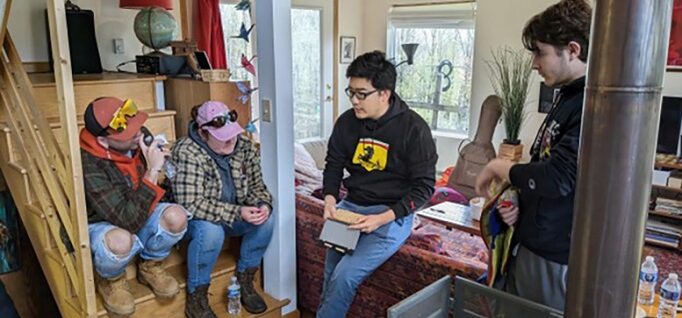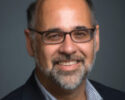Collaborating to learn about humanitarian needs
By David J. Smith
May 17, 2023
Jordan Cutter is a student at Allegany College of Maryland (ACM) looking to start in its nursing program. Last month, he participated in a unique two-day “field simulation” hosted by the Forage Center for Peacebuilding and Humanitarian Education, which prepares students for careers in humanitarian, emergency response and peacebuilding areas.
We strongly believe that genuine and transformative learning takes place through experience, as such, our emphasis is on simulation-based opportunities to role-play as individuals experiencing the work of aid workers and those suffering from human-made and natural disasters. We strongly adhere to educational theorist John Dewey’s belief that both experience and reflection on the experience are the cornerstones to education. Once a simulation is completed, we spend considerable time reflecting and self-discovery with the participants.
Learning while role-playing
Cutter played an internally displaced person who was homeless because of social conflict and wildfires in the fictional country of Costero. After the event, he reflected that “I decided to step outside of the box of my usual comfort zone. I’m often quite reserved, observant, yet cheerful. I decided to play the role of an erratic, stressed and verbal character.”
Through the exercise, Cutter understood typical characteristics of someone fleeing a disaster. Role-playing gave him the chance to experience personal hardship, vulnerability and need by “walking in another person’s shoes.” Role players develop empathy and a deeper understanding of the plight of those from other cultures and environments. This in turn leads to a more generous attitude toward those experiencing forced migration.
The simulation gave “my students the opportunity to move beyond their own cultural perspectives to see how the world impacts others, especially in terms of stress and humanitarian crises,” noted Diane McMahon, Cutter’s professor at ACM, who teaches sociology and is a supporter of peacebuilding and humanitarian education with her students.
Lena Choudhary, a Forage Center staff member and associate professor of nursing at Montgomery College (Maryland), believes that experiential learning is the most impactful for students.
“For nursing education, it is essential that nursing students engage in experiences as both nurses and patients at times, why not the same for humanitarian education?” Choudhary contends.
A broader experience, goal
Cutter and eight other ACM students engaged in roles to provide master’s degree students from George Mason University’s Carter School for Peace and Conflict Resolution and American University’s School of International Service the opportunity to experience the work of humanitarian aid professionals. Graduate students participate in the simulation as part of a course I offer at George Mason University. Many are exploring careers in humanitarian assistance. The field simulation is designed for them to experience what life is like for professionals serving displaced persons.
For community college students, this is a chance to learn about humanitarian conditions and the lived experiences of displaced persons. For both student groups, this was a powerful learning opportunity, cutting across cultural, educational and social backgrounds. Rarely do graduate and community college students have a chance to work collaboratively in this way.
The Forage Center has been holding field simulations for nearly 10 years. In 2018, it started working with ACM and its students. Providing all students with such an opportunity – including community college students who may have experienced displacement themselves as immigrants – is important in advancing humanitarianism. And giving community college students the opportunity to work with graduate students can provide them with models of potential educational and career paths. Increasingly within my graduate student classes, I’m seeing more and more students starting their higher education in community colleges.
The impact of climate change, ethnic and social conflict, and natural disasters such as famine, earthquakes and hurricanes will only increase in future years causing people to migrate. The UN Refugee Agency predicts that 117.2 million people will be forcibly displaced in 2023. The need for humanitarian workers will be more urgent in the future. Simulation-based education can be a critical part of that. Community colleges can play an important role in preparing humanitarian workers for the future.
This article originally appeared in CC Daily.



